
Test HP EliteBook Folio 1040 G4 (FHD, 7820HQ) Laptop
Intel Core i7-7820HQ | Intel HD Graphics 630 | 14.00" | 1.5 kg

Der Intel Core i7-7820HQ ist ein schneller Quad-Core-Prozessor für Notebooks auf Basis der Kaby-Lake-Architektur, der im Jänner 2017 vorgestellt wurde. Zum Zeitpunkt der Präsentation ist er das zweitschnellste Modell seiner (Consumer) Baureihe. Neben den vier CPU-Kernen inklusive Hyper-Threading-Support, die mit 2,9 bis 3,9 GHz takten (4 Kerne: max. 3,5 GHz, 2 Kerne: max. 3,5 GHz), integriert der Prozessor auch eine HD Graphics 630 Grafikeinheit sowie einen Dual-Channel-Speichercontroller (DDR3L-1600/DDR4-2133). Die Fertigung erfolgt in einem 14-Nanometer-Prozess mit FinFET-Transistoren.
Architektur
Im Vergleich mit Skylake hat Intel die zugrundeliegende Mikroarchitektur praktisch unverändert übernommen, sodass sich keine Unterschiede in der Pro-MHz-Leistung ergeben. Überarbeitet wurde lediglich die Speed-Shift-Technik zur schnelleren dynamischen Anpassung von Spannungen und Taktraten, zudem gestattet der gereifte 14-Nanometer-Prozess deutlich höhere Frequenzen und eine bessere Energieeffizienz als bislang.
Performance
Durch die hohen Taktraten schlägt der 7820HQ auch das Skylake Spitzenmodell i7-6920HQ (2,9 - 3,8) der Skylake Generation knapp. Der schnellere i7-7920HQ der selben Generation bietet noch einmal 200 MHz mehr Takt, ist jedoch auch deutlich teurer. Dadurch reicht die Leistung auch für sehr anspruchsvolle Aufgaben.
Grafikeinheit
Die integrierte Intel HD Graphics 630 Grafikkarte verfügt wie die alte HD Graphics 530 über 24 Ausführungseinheiten (EUs) und taktet in diesem Fall mit 350 - 1100 MHz. Die Performance hängt stark vom verwendeten Arbeitsspeicher ab; mit schnellem DDR4-2133 im Dual-Channel-Betrieb sollte die Leistung mit einer dedizerten Nvidia GeForce 920M vergleichbar sein.
Anders als Skylake kann Kaby Lake nun auch H.265/HEVC im Main10-Profil mit 10 Bit Farbtiefe sowie Googles VP9-Codec in Hardware decodieren. Die Anfang Jänner eingeführten Dual-Core-Kaby-Lake-Prozessoren sollten außerdem schon HDCP 2.2 beherrschen.
Leistungsaufnahme
Die Fertigung erfolgt in einem weiter verbesserten 14-Nanometer-Prozess mit FinFET-Transistoren, wodurch die Energieeffizienz nochmals spürbar gestiegen ist. Die TDP wird mit 45 Watt spezifiziert und kann je nach Einsatzzweck auch auf 35 Watt abgesenkt werden vom Notebookhersteeller (cTDP Down). Dadurch verringert sich jedoch auch die Durchschnittliche Leistung, da der Turbo nicht so lange gehalten wird.
| Codename | Kaby Lake | ||||||||||||||||||||||||||||||||||||||||||||||||||||||||||||||||||||||||||||||||||||||||||||||||||||||||||||||||||||||||||||||||||||||||||||||||||||||||||||||||||||||||
| Serie | Intel Kaby Lake | ||||||||||||||||||||||||||||||||||||||||||||||||||||||||||||||||||||||||||||||||||||||||||||||||||||||||||||||||||||||||||||||||||||||||||||||||||||||||||||||||||||||||
Serie: Kaby Lake Kaby Lake
| |||||||||||||||||||||||||||||||||||||||||||||||||||||||||||||||||||||||||||||||||||||||||||||||||||||||||||||||||||||||||||||||||||||||||||||||||||||||||||||||||||||||||
| Taktung | 2900 - 3900 MHz | ||||||||||||||||||||||||||||||||||||||||||||||||||||||||||||||||||||||||||||||||||||||||||||||||||||||||||||||||||||||||||||||||||||||||||||||||||||||||||||||||||||||||
| Level 1 Cache | 256 KB | ||||||||||||||||||||||||||||||||||||||||||||||||||||||||||||||||||||||||||||||||||||||||||||||||||||||||||||||||||||||||||||||||||||||||||||||||||||||||||||||||||||||||
| Level 2 Cache | 1 MB | ||||||||||||||||||||||||||||||||||||||||||||||||||||||||||||||||||||||||||||||||||||||||||||||||||||||||||||||||||||||||||||||||||||||||||||||||||||||||||||||||||||||||
| Level 3 Cache | 8 MB | ||||||||||||||||||||||||||||||||||||||||||||||||||||||||||||||||||||||||||||||||||||||||||||||||||||||||||||||||||||||||||||||||||||||||||||||||||||||||||||||||||||||||
| Anzahl von Kernen / Threads | 4 / 8 | ||||||||||||||||||||||||||||||||||||||||||||||||||||||||||||||||||||||||||||||||||||||||||||||||||||||||||||||||||||||||||||||||||||||||||||||||||||||||||||||||||||||||
| Stromverbrauch (TDP = Thermal Design Power) | 45 Watt | ||||||||||||||||||||||||||||||||||||||||||||||||||||||||||||||||||||||||||||||||||||||||||||||||||||||||||||||||||||||||||||||||||||||||||||||||||||||||||||||||||||||||
| Herstellungstechnologie | 14 nm | ||||||||||||||||||||||||||||||||||||||||||||||||||||||||||||||||||||||||||||||||||||||||||||||||||||||||||||||||||||||||||||||||||||||||||||||||||||||||||||||||||||||||
| Max. Temperatur | 100 °C | ||||||||||||||||||||||||||||||||||||||||||||||||||||||||||||||||||||||||||||||||||||||||||||||||||||||||||||||||||||||||||||||||||||||||||||||||||||||||||||||||||||||||
| Features | Dual-Channel DDR4 Memory Controller, HyperThreading, AVX, AVX2, Quick Sync, Virtualization, AES-NI | ||||||||||||||||||||||||||||||||||||||||||||||||||||||||||||||||||||||||||||||||||||||||||||||||||||||||||||||||||||||||||||||||||||||||||||||||||||||||||||||||||||||||
| GPU | Intel HD Graphics 630 (300 - 1150 MHz) | ||||||||||||||||||||||||||||||||||||||||||||||||||||||||||||||||||||||||||||||||||||||||||||||||||||||||||||||||||||||||||||||||||||||||||||||||||||||||||||||||||||||||
| 64 Bit | 64 Bit wird unterstützt | ||||||||||||||||||||||||||||||||||||||||||||||||||||||||||||||||||||||||||||||||||||||||||||||||||||||||||||||||||||||||||||||||||||||||||||||||||||||||||||||||||||||||
| Architecture | x86 | ||||||||||||||||||||||||||||||||||||||||||||||||||||||||||||||||||||||||||||||||||||||||||||||||||||||||||||||||||||||||||||||||||||||||||||||||||||||||||||||||||||||||
| Anfangspreis | $378 U.S. | ||||||||||||||||||||||||||||||||||||||||||||||||||||||||||||||||||||||||||||||||||||||||||||||||||||||||||||||||||||||||||||||||||||||||||||||||||||||||||||||||||||||||
| Vorgestellt am | 03.01.2017 | ||||||||||||||||||||||||||||||||||||||||||||||||||||||||||||||||||||||||||||||||||||||||||||||||||||||||||||||||||||||||||||||||||||||||||||||||||||||||||||||||||||||||



Microsoft Surface Studio 2-LAL-00003: NVIDIA GeForce GTX 1070 (Desktop), 28.00", 9.4 kg
Externer Test » Microsoft Surface Studio 2-LAL-00003
Aorus X9 v7: NVIDIA GeForce GTX 1070 Mobile, 17.30", 3.6 kg
Externer Test » Aorus X9 v7
HP Elitebook 1040 G4-2XU40UT: Intel HD Graphics 630, 14.00", 1.5 kg
Externer Test » HP Elitebook 1040 G4-2XU40UT
Fujitsu Celsius H770-P161DE: NVIDIA Quadro M2200, 15.60", 2.8 kg
Externer Test » Fujitsu Celsius H770-P161DE
Dell Latitude 5580-X1W6W: NVIDIA GeForce 940MX, 15.60", 2.2 kg
Externer Test » Dell Latitude 5580-X1W6W
Dell Precision 5520-F84DY: NVIDIA Quadro M1200, 15.60", 1.8 kg
Externer Test » Dell Precision 5520-F84DY
Apple MacBook Pro 15 2017 (2.9 GHz, 560): AMD Radeon Pro 560, 15.40", 1.8 kg
Externer Test » Apple MacBook Pro 15 2017 (2.9 GHz, 560)
Dell Latitude 14 5480, Core i7-7820HQ: Intel HD Graphics 630, 14.00", 1.8 kg
Externer Test » Dell Latitude 14 5480, Core i7-7820HQ
Acer Predator 17 G9-793-5593 : NVIDIA GeForce GTX 1080 Mobile, 17.30", 4.5 kg
Externer Test » Acer Predator 17 G9-793-5593
Dell Precision 3520: NVIDIA Quadro M620, 15.60", 2.3 kg
Externer Test » Dell Precision 3520
» Vergleich mobiler Prozessoren
Alle CPU Serien für Notebooks mit kurzer Beschreibung
» Mobile Prozessoren - Benchmarkliste
Sortier- und filterbare Benchmark-Liste